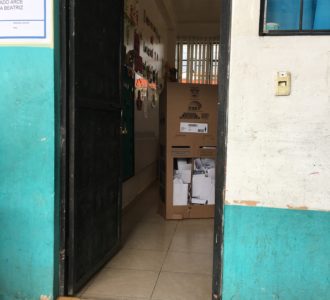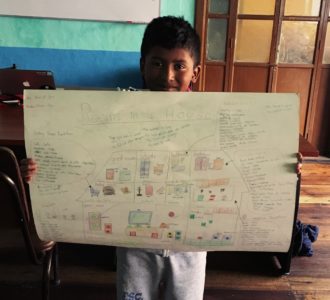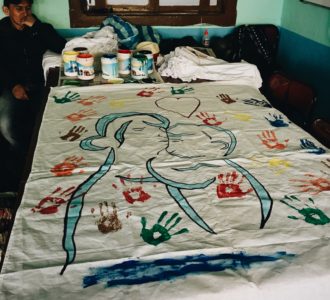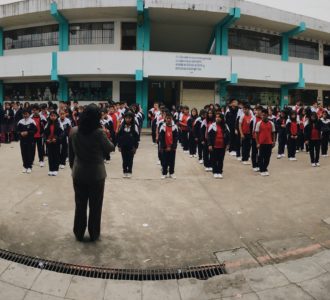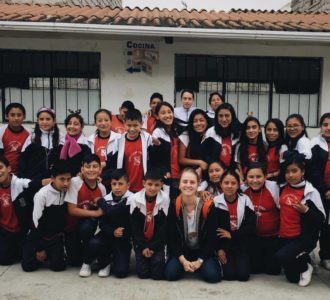“Tú hablas cuatro idiomas? De verdad? (You speak four languages? Really?)”, I often hear from Ecuadorians when I tell them that I speak German, French, English and Spanish fluently. They then frequently tell me that they only speak one language, Spanish, or sometimes two, Spanish and the local one, Kichwa. It is often said in a tone of admiration and embarrassment. But I do not think that either of the two reactions is necessary. I do not deserve admiration for speaking four languages because anyone who would have grown up in a French speaking city with German parents, then have gone two years to boarding school in the UK and finally lived 8 months in Ecuador with a Spanish speaking host family, would be a polyglot. Embarrassment is even less justified because most of the time the person I speak with just did not have the opportunity to learn another language. One could argue that at school every Ecuadorian has English classes and therefore, should be able to speak the language. However, for this to become an equation the government would need to employ English teachers that actually master the English language well. There are some, but from my experience, not many of them.
Learning a new language from someone that barely speaks the language is a real challenge. For instance, the other day when I was tutoring a girl in English she told me that I made a mistake. In her opinion, I had to change We are to We is. I asked her why she thought so and her response was that her teacher had taught her that. After having a look at her notebook, I saw that her teacher had actually written We is. How can an eleven year old pupil learn English if her teacher cannot even properly conjugate the verb “to be”?
The “language story” is only one example of something where I had an opportunity that most people in Ecuador or elsewhere do not have. Another example is that I got the opportunity to go to Ecuador, live there and learn about a new culture. When I am at school, I try to teach my students to be as open minded as possible, however, if you and your family lived in the same town all life long and it is the only place you know, then that is not as easy as it seems. I also tell my students to follow their dreams, but when the government decides for you what you should study at University, if you can go at all (many pupils drop out of school), then that is not that easy either. And when it comes to voting for your government, not all Ecuadorians can vote for whom they feel like voting. Many people who are employed by the government have to campaign and vote for it (not something the government would admit to).
Many of the people I met during the past months do not have the opportunity to do with their life what they want, for many reasons – ranging from a lack of knowledge what is important for them in life to a lack of choice to pursue it. And having observed this during the past 7 months, I have come to realise that having choices and opportunities in life is a privilege and that we have to work towards a future where it will not be a privilege anymore. No matter the financial and racial background of someone, everyone should have choices and opportunities to go for their goals in life.
I acknowledge that many nations already try to achieve that to a certain extend with public funding, such as Germany through its very good public Universities and Sweden by helping families of any size with government funds. In Ecuador the government (a socialist government) is offering free instrument and sports lessons, also giving kids more equal opportunities. Overall though, more has to be done. And not only in Ecuador, but in global terms, including Germany and Sweden.
You might now think that my way of thinking is idealistic, but if I do not believe in idealistic scenarios then what is the point in having a vision? I believe in a world where governments strive that all their citizens are given the same opportunities in life – in terms of access to education, access to employment, access to health care. Whether afterwards they make use of it is their choice. I even go a step further, in my dream; citizens from all over the world should have these opportunities all over the world. Many people will disagree with me, but I would love to live in a world where someone born in the Philippines can go and live in the UK and study, work and live there with the same opportunities that a UK citizen is having, and vice versa. The European Union, for instance, is already a step closer to that scenario than most regions in the world, but it just benefits the countries within the Union and therefore, still consists of “borders of opportunities”.
Overall, you might be a bit surprised now and wonder what message I am trying to bring across. This blog is basically a reflection on one thing I have realised in the past months, which is that “choices and opportunities for all” are needed to live in a fair and peaceful world. I wanted to share this reflection with you and hope that we can all work together to achieve this precious goal!
PS: I really appreciate institutions such as Global Citizen Year and United World Colleges, as through their huge scholarship funds they give kids from all backgrounds the opportunity to join their programmes and benefit of global education and local experiences on the ground across nations. They may serve as an important building block to advance on the path to more choices and opportunities for people across the world.

